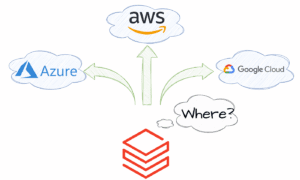There has been a rapid increase in cloud computing applications and platforms in virtually every industry. This technology serves as the backbone of new digital businesses. Over 77 percent of companies utilize some form of cloud technology. Many platforms exist for cloud computing, but only two dominate the market. Microsoft’s Azure and Amazon’s Web Services are the two largest cloud service providers. So, more and more IT professionals are obtaining Microsoft certification.
What is Microsoft Azure?
Microsoft Azure Fundamentals are necessary to secure any Microsoft certification in the cloud computing sector. Microsoft Azure certification consists of Azure’s features, their benefits, and how to use them.
An Azure subscription provides access to and management Microsoft’s cloud computing platform and an online portal. Data storage and transformation are some of the available services and resources. All you need to access these services and resources is a computer with an active connection to the Internet and access to the Azure portal. Considering what Azure offers, the Azure certification cost is also worthwhile.
The Microsoft Cloud certification program was launched on February 1, 2010, much later than its most direct competitor, Amazon Web Services. Notably, eighty percent of Fortune 500 companies utilize Azure cloud services.
How does Azure work, and what are its various services?
The Microsoft Azure certification provides access to over 200 services, grouped into 18 categories. They include computing, networking, storage, IoT, mobile, migration, containers, analytics, AI, machine learning tools, management tools, integration, software security, development tools, DevOps, databases, web services, and media identity.
Below we list the important Azure services by category:
Compute Services
- Virtual Machine Service: You can create a virtual machine in seconds using this service, whether you are using Windows or Linux.
- Cloud Service: This Azure service allows you to create cloud-based applications that can be scaled up or down. After the application has been deployed, Azure takes care of all the aspects related to balancing load, provisioning, and monitoring performance.
- Service Fabric: Microservice development is simplified significantly with service fabric. A microservice comprises smaller applications that are bundled together.
- Functions: These allow you to write programs in a variety of languages. A vital advantage of this service is that it does not require any hardware. There are Azure certifications that cover these requirements. All that is needed is the code.
Networking
- Azure CDN: Azure Content Delivery Network (CDN) provides users with access to content. It utilizes a large amount of bandwidth, and you can transfer content anywhere in the world. This service uses an extensive system of servers distributed strategically across the globe to provide the fastest possible access to the data for users.
- Express Route: Through this service, your on-premises network is connected to a Microsoft cloud or any other service you desire using a secure connection. This means that the only communication that happens here is between the enterprise network and the service you wish to use.
- Virtual network: It allows you to connect any Azure service to another on a private and secure network.
- Azure DNS: With this Azure service, you can host any DNS or system domain on the Azure platform.
Storage
- Disk Storage: With this service, you will have the option to choose either HDD or SSD as the storage solution for your virtual machine.
- Blob Storage: This service allows users to store large amounts of unstructured data, such as text files and even binary files.
- File Storage: SMB (server message block) is an industry-standard protocol that can be used to access this particular file storage service.
- Queue Storage: This type of system allows a large number of messages to be queued. A user can access this service from any location.
Why should you use Azure?
In light of your newfound knowledge about Microsoft Azure fundamentals and its services, you may wish to continue exploring its various applications.
- Development of applications: There is no limit to the type of applications you can develop in Azure.
- Tests: Once an application has been successfully developed on the platform, it can be tested.
- Hosting of applications: Azure can provide hosting support for applications once the testing is completed.
- Creating virtual machines: Azure allows you to create virtual machines based on your desired configuration.
- Integration and synchronization capabilities: Azure supports the integration and synchronization of virtual machines and directories.
- Metrics collection and archiving: Azure provides the capability to collect and store metrics that can help identify what is working.
- Virtual hard disks: Virtual hard disks enlarge the capacity of virtual machines and are normally used for storing a substantial amount of data.
In conclusion
Microsoft Azure fundamentals offer more than 200 services and numerous benefits, making it the cloud computing platform of choice for more businesses than ever. With companies increasingly implementing Azure, many opportunities are being created for IT professionals familiar with this technology. This being the right time to pursue a career in Azure, you can begin by registering for an Azure certification training program.



































